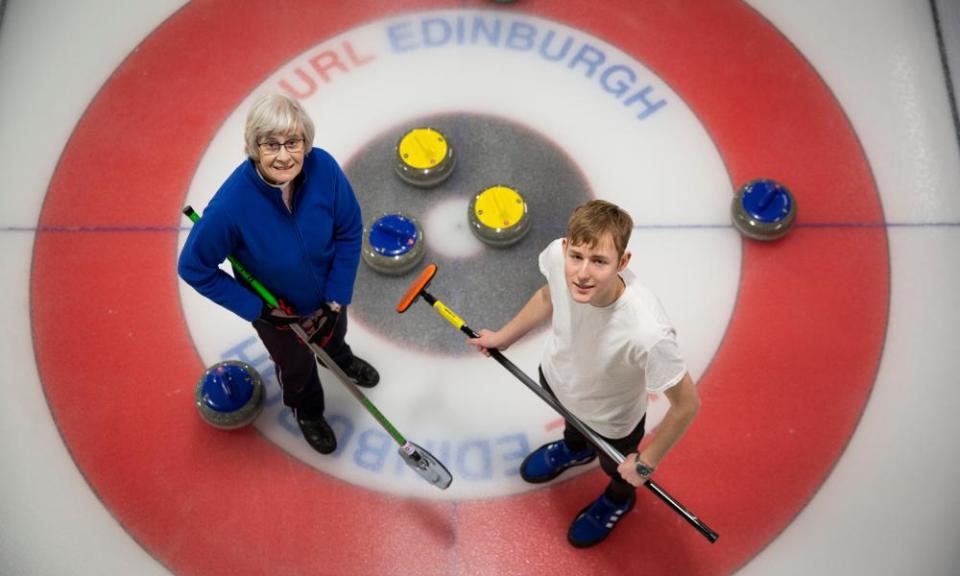Winter Olympics curling triumph draws new generation to the ice

The mottled ice at Curl Edinburgh was thronged with players, as competitors in a ladies’ league gracefully lunged forwards with their curling stones, arms and legs out-stretched. Teammates busily swept hard at the ice, to help the granite gain an extra few millimetres of ground.
Mondays are often busy at Edinburgh’s only curling centre. But this Monday has been transformed by Team GB’s gold and silver medal triumphs at the winter Olympics. Two of the medal-winners play there, as do previous Olympic and world champions.
Aaron Forsyth, the rink’s manager, said the centre had been inundated with inquiries about the sport since the victories in Beijing. “We’ve received hundreds of emails or clicks in the last few days where people have asked to try curling,” he said. “It’s fantastic.”
Part of the challenge, Forsyth said, could be accommodating them all, and particularly supporting the younger children whose interest in the game has been sparked. Guiding those 20kg (44lb) stones down the ice takes greater strength than it may seem.
He believes curling is the UK’s dominant winter Olympics discipline. Team GB’s modest medal rush came late in the games and entirely from curling. After the frustrations of the mixed team coming fourth, the men’s team took silver on Saturday and then the women’s team comprehensively defeated Japan 10-3 in Sunday’s final.
And Curl Edinburgh is perhaps one of the sport’s most successful venues. Open more than 12 hours a day to numerous clubs and leagues, its players drawn from the city’s banks, doctors, local teams and from nearby towns such as Peebles, it is also a popular venue for holidaymakers.
Seen in the UK as an archetypally Scottish sport, Forsyth hosts school parties from England, companies from London organising staff awaydays, and large groups of friends visiting Edinburgh for stag and hen parties. “The Olympics is going to add to this,” he said. “The goal is to keep the momentum going.”
Those medals could not have come at a better time, said Maggie Wilson of Scottish Curling. The organisation hopes it will produce a rise in interest from new, younger players. “The Olympics has shown how exciting it is, and really entertaining for all the ages,” Wilson said, citing the women team’s nerve-racking victory over Sweden in the semi-finals.
One of the game’s youngest ambassadors is Jamie Rankin, an 18-year-old student from a curling dynasty. His mother, Janice Rankin, was part of Great Britain’s gold medal-winning team at the Salt Lake City winter games in 2002; his grandmother Barbara was playing in a league competition at Curl Edinburgh on Monday morning while he worked part-time in its cafe upstairs.
Rankin, a business student originally from Elgin, coaches Edinburgh University’s curling team. And he is “100%” clear about his ambition. “I want to go to the Olympics one day. That’s what I’m working towards, definitely.”
He believes the sport will attract younger competitors. At home in Elgin, the local youth team was 25 to 30 strong. “I have got a couple of my friends watching it, and they’re always messaging me, saying, ‘Why are they doing this?’ or ‘What does that mean?’ I’m going to get them to come along.”
The sport has had a difficult pandemic. It is chiefly played in the winter and almost entirely on indoor rinks. And even though Team GB’s medal winners are in their 20s and 30s, most of curling’s active players are middle-aged or older.
Scotland’s rinks were closed by lockdowns over the winter of 2020-21, and again in October last year, just three weeks after the season began. Older players were reluctant to congregate in indoor venues, and many drifted away. Scottish Curling estimates that about a tenth of its 10,000 members gave up the sport during the Covid crisis.
The sport’s greatest challenge, Wilson said, is keeping its youth players involved in the sport once they leave home for university or their first full-time job. Then the participation rates take a steep dive.
Dave Leith, the head of performance support with British Curling, the sport’s competition organisation, said: “It’s quite a big challenge. We’ve already started to crack that nut to some degree because we’ve got a lot of strength in depth now, in a way I don’t think we’ve seen for quite some time, but there’s still a lot of work to be done there.”

 Yahoo Sport
Yahoo Sport 





































